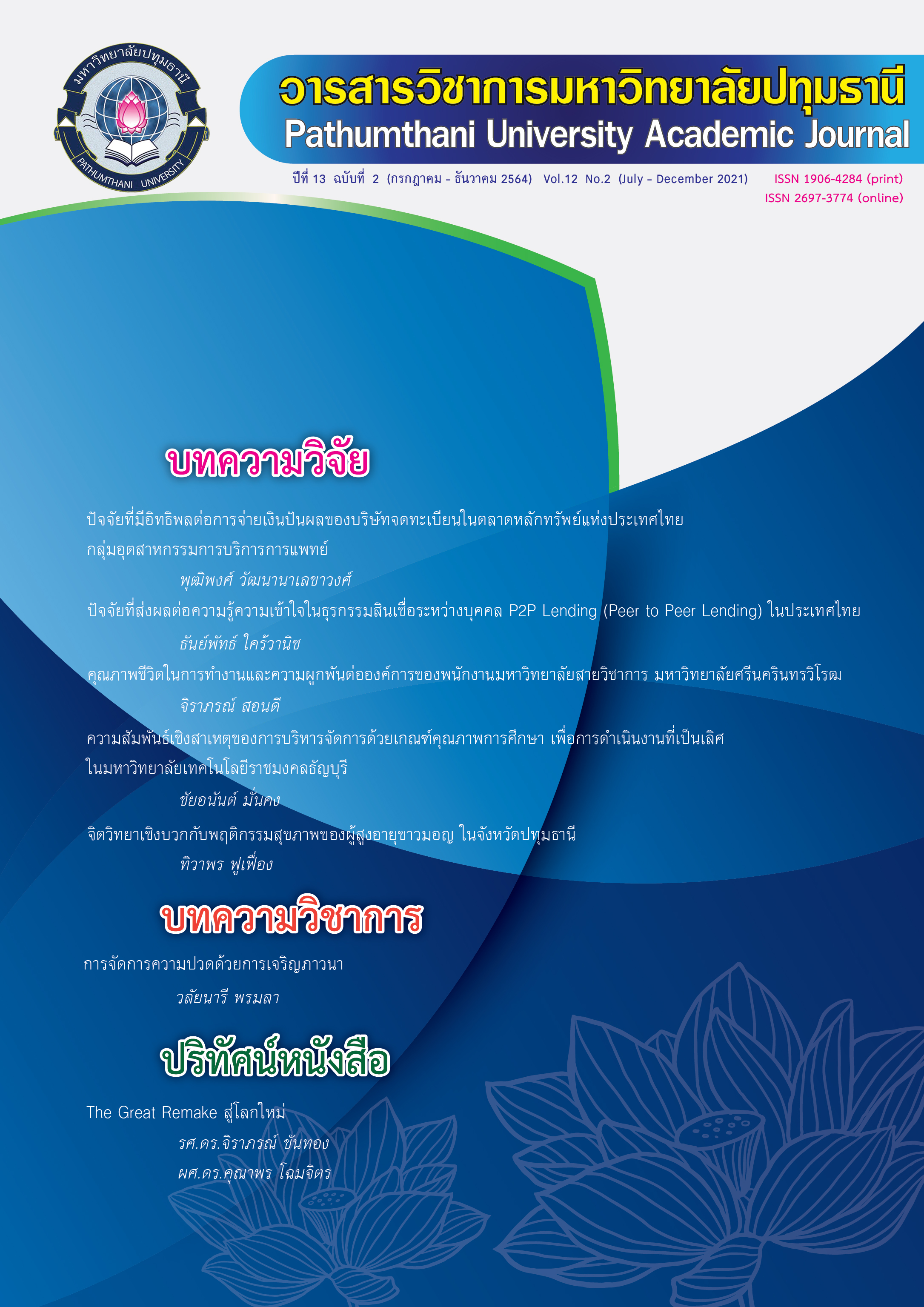ปัญหาและแนวทางการพัฒนาการบริหารงานพัสดุของผู้ปฏิบัติงานพัสดุ มหาวิทยาลัยเทคโนโลยีราชมงคลธัญบุรี
คำสำคัญ:
การบริหารงานพัสดุ, ปัญหาการบริหารงานพัสดุ, แนวทางการพัฒนางานพัสดุบทคัดย่อ
การวิจัยครั้งนี้มีวัตถุประสงค์เพื่อ 1) เพื่อศึกษาสภาพปัญหาการบริหารพัสดุของ
ผู้ปฏิบัติงานพัสดุ ในมหาวิทยาลัยเทคโนโลยีราชมงคลธัญบุรี 2) เพื่อศึกษาแนวทางการพัฒนาการบริหารงานพัสดุ ตามความเห็นของผู้ปฏิบัติงานพัสดุ มหาวิทยาลัยเทคโนโลยีราชมงคลธัญบุรี ประชากร เป็นผู้ปฏิบัติหน้าที่งานพัสดุภายในมหาวิทยาลัยเทคโนโลยีราชมงคลธัญบุรี ประกอบด้วย หัวหน้าเจ้าหน้าที่พัสดุ หรือเจ้าหน้าที่พัสดุโรงเรียน จำนวน 120 คน ใช้แบบสอบถามมาตราส่วนประมาณค่า แบ่งออกเป็น 5 ระดับ ที่ผู้วิจัยสร้างขึ้นอาศัยแนวคิดจากการทบทวนเอกสารและงานวิจัยที่เกี่ยวข้อง โดยเป็นการสอบถามปัญหาและแนวทางการพัฒนาการบริหารงานพัสดุของผู้ปฏิบัติงานพัสดุ แบบสอบถามแบ่งออกเป็น 2 ตอน สถิติที่ใช้ในการวิเคราะห์ ได้แก่ ค่าเฉลี่ย ( ) และความเบี่ยงเบนมาตรฐาน (S.D.)
ผลการวิจัย พบว่า ระดับปัญหาการบริหารพัสดุของผู้ปฏิบัติงานพัสดุในมหาวิทยาลัย
เทคโนโลยีราชมงคลธัญบุรี โดยภาพรวมพบปัญหาอยู่ในระดับน้อย เมื่อพิจารณารายด้าน พบว่า ด้านกระบวนการซื้อหรือจ้าง และการบริหารสัญญาและการตรวจรับพัสดุ ด้านการบริหารพัสดุ และด้านการบำรุงรักษา การตรวจสอบ โดยภาพรวมอยู่ในระดับน้อย ส่วนด้านการจำหน่ายพัสดุ โดยภาพรวมอยู่ในระดับระดับปานกลาง แนวทางการพัฒนาการบริหารงานพัสดุผลการวิจัย พบว่า ปัญหาส่วนใหญ่ของการปฏิบัติงานเกิดจากผู้ปฏิบัติงานด้านพัสดุอขาดการวางแผนในกระบวนการของงานพัสดุ และขาดการศึกษาระเบียบเกี่ยวกับงานพัสดุ ทำให้การปฏิบัติงานเกิดความผิดพลาด โดยผู้ให้ข้อมูลเสนอแนวทางการพัฒนาการบริหารงานพัสดุ โดยให้หน่วยงานสนับสนุนให้ผู้ปฏิบัติงานได้เข้ารับการอบรม การจัดทำขั้นตอนการปฏิบัติงานในการจัดซื้อจัดจ้าง และแจ้งให้ผู้ปฏิบัติงานภายในองค์กรทราบโดยทั่วกัน รวมถึงการศึกษาระเบียบเกี่ยวกับงานพัสดุ เพื่อให้การปฏิบัติงานเป็นไปในทิศทางเดียวกัน และทำให้การปฏิบัติไม่เกิดความล่าช้า
เอกสารอ้างอิง
กนกวรรณ จริงจิตร. (2553). ศักยภาพการบริหารพัสดุของเทศบาลนครตรัง อำเภอเมือง จังหวัดตรัง. ปริญญานิพนธ์วิทยานิพนธ์มหาบัณฑิต. มหาวิทยาลัยขอนแก่น.
กาญจนา พุ่มพวง. (2557). ความพึงพอใจต่อการให้บริการของกลุ่มงานพัสดุ. กรุงเทพมหานคร : สถาบันบัณฑิตพัฒนบริหารศาสตร์.
ธเนศ หอมทวน. (2553). ศึกษาปัญหาและแนวทางแก้ไขปัญหาการบริหารงานพัสดุในโรงเรียนสังกัดสำนักงานเขตพื้นที่การศึกษาสระแก้ว เขต 2. วิทยานิพนธ์ปริญญาการศึกษามหาบัณฑิต สาขาวิชาการบริหารการศึกษา. มหาวิทยาลัยบูรพา.
นภัสสร บุรารัตนวงศ์. (2554). ปัญหาและแนวทางการพัฒนาการบริหารงานพัสดุของโรงเรียน สังกัดสำนักงานเขตพื้นที่การศึกษาประถมศึกษาระยอง เขต 1. งานนิพนธ์การศึกษามหาบัณฑิต. มหาวิทยาลัยบูรพา.
บุญสุดา แก้วกระจาย. (2554). ศึกษาความพึงพอใจในการบริหารงานพัสดุที่ส่งผลต่อประสิทธิภาพในการปฏิบัติงานพัสดุของข้าราชการองค์การบริหารส่วนจังหวัดนครราชสีมา. วิทยานิพนธ์ปริญญาการศึกษามหาบัณฑิต. มหาวิทยาลัยเทคโนโลยีราชมงคลอีสาน.
บุปผา ไชยแสง, อิ่มจิต เลิศพงษ์สมบัติ และ ฐะปะนีย์ เทพญา. (2557). “การใช้สารสนเทศเพื่อการบริหารจัดการพัสดุตามหลักธรรมาภิบาลของมหาวิทยาลัยสงขลานครินทร์ วิทยาเขตปัตตานี”. อินฟอร์เมชั่น. ปีที่ 21 ฉบับที่ 2. หน้า 1-17.
พระราชบัญญัติการจัดซื้อจัดจ้างและการบริหารพัสดุภาครัฐ พ.ศ.2560. (2560, 23 สิงหาคม). ราชกิจจานุเบกษา. เล่ม 134 ตอนพิเศษ 210 ง, หน้า 1-71.
ลดาวัลย์ พราหมณ์น้อย. (2554). ปัญหาการบริหารงานพัสดุในองค์การบริหารส่วนตำบลในเขต อำเภอเมืองเพชรบุรี จังหวัดเพชรบุรี. วิทยานิพนธ์ปริญญามหาบัณฑิต. มหาวิทยาลัยราชภัฎเพชรบุรี.
สำนักงานคณะกรรมการการศึกษาขั้นพื้นฐาน. (2552). คู่มือพัสดุ. กรุงเทพมหานคร : โรงพิมพ์อักษรไทย.
สุกัญญา ศรีทับทิม. (2555). กลยุทธ์ในการเพิ่มประสิทธิภาพการบริหารงานพัสดุ. วิทยานิพนธ์ปริญญามหาบัณฑิต. มหาวิทยาลัยสุโขทัยธรรมาธิราช.
สุทธิพรรณ เนียมสันเทียะ. (2557). ศึกษาปัญหาและแนวทางการพัฒนาการบริหารงานพัสดุของโรงเรียน ในสังกัดสำนักงานเขตพื้นที่การศึกษาประถมศึกษาชลบุรี เขต 1. วิทยานิพนธ์ปริญญาการศึกษามหาบัณฑิต. มหาวิทยาลัยบูรพา
อุรา วงศ์ประสงค์ชัย. (2556). “ศึกษาปัญหาการบริหารงานพัสดุของผู้ปฏิบัติงานพัสดุมหาวิทยาลัยนเรศวร”. วารสารบัณฑิตศึกษา มหาวิทยาลัยราชภัฏพิบูลสงคราม. ปีที่ 7 ฉบับที่ 1. หน้า 139-148.
ดาวน์โหลด
เผยแพร่แล้ว
รูปแบบการอ้างอิง
ฉบับ
ประเภทบทความ
สัญญาอนุญาต
บทความที่ได้รับการตีพิมพ์เป็นลิขสิทธิ์ของวารสารมหาวิทยาลัยปทุมธานี
ข้อความที่ปรากฎในบทความแต่ละเรื่อง เป็นความคิดเห็นส่วนตัวของผู้เขียน กองบรรณาธิการไม่จำเป็นต้องเห็นด้วยเสมอไป และไม่มีส่วนรับผิดชอบใด ๆ ถือเป็นความรับผิดชอบของผู้เขียนแต่เพียงผู้เดียว



